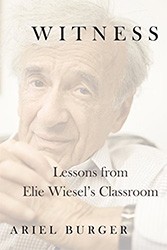A problem for the reviewer: Whether to begin by reading I.F. Stone’s own writings, as presented in a collection of the best of his collected essays, or to start with MacPherson’s biography of this legendary journalist? Both approaches are defensible, but ultimately, the decision was made to absorb how Stone himself perceived important events and then to use his beliefs as a check against his biographer’s examination of his life.
I.F. Stone’s Weekly, a one-man newsletter published between 1953 and 1971, was as independent of outside influences as Stone: suspicious of governments and the spin they put on events, fiercely intolerant of demagoguery, fearful of man’s potential for causing nuclear disaster, and although a philosophical supporter of Zionism, critical of the State of Israel. In his weekly analyses, Stone illuminated these issues, challenged popular ideas, and engaged his devoted readers to refine their beliefs and identify heroes.
Karl Weber, editor of The Best of I.F. Stone, chose and annotated a series of essays written by Stone over three decades, including some originally published elsewhere. Organized by theme, these works illustrate Stone the conversationalist, the occasional satirist, but always the polemicist who is committed to exposing sacred cows and to supporting human rights. Stone’s basic philosophy may be understood by reading a 1949 essay: “…you cannot have freedom without the risk of its abuse. The men who wrote the Bill of Rights were willing to take their chances on freedom…everything we know from the past teaches us that suppression in the long run provides an illusory security, and this is why, though I am a socialist, I am also a libertarian.” Stone’s unintentionally prophetic words provide insight for different eras, and certainly for our own.
Stone’s position on Israel-as-political-entity was more complicated and controversial. Although passionately identified with the right of Jews to survive after facing “the authenticated horrors of the Nazi internment camps and death chambers,” Stone opposed the seizure of Arab-owned lands. He detested the American government’s equivocation when they had a chance to save Jews (although he exonerated Roosevelt from blame) and decried the way Jews viewed the Arabs with “contemptuous superiority,” while acknowledging the Arabs’ intransigence at their unwillingness to accept a Jewish state in Palestine. Yet he ultimately expected Jews to observe a higher moral standard: “…if Jews, after all their experience of suffering, prove no better once in the majority than the rest of mankind, what hope for a world as torn apart as ours is by tribalism and hate.”
Izzy Stone’s writings illuminated the important issues of his age. This explains the popularity and resilience of his weekly newsletter. His richly-nuanced essays were entertaining and provocative. They reveal Stone, the man, as we confirm by reading Myra MacPherson’s comprehensive biography, All Governments Lie.
This is a readable, interesting depiction of Stone’s personal and professional life. MacPherson conveys her admiration for her subject, but by unintentionally embracing the iconography of Stone — the-independent, the courageous maverick, the early supporter of civil rights and opponent of Vietnam policy, she yields more insights into how similar she and Stone are, politically, than into the dimensions of Stone’s richly nuanced arguments. Fearful of having his judgment compromised by being too close to Washington’s decision-makers, Stone courted neutrality as he did most things, passionately, which MacPherson underscores by contrasting him with Walter Lippmann, the ultimate insider to the Washington establishment. Yet, while this serves her purpose of elevating Stone to heroic stature by placing him squarely on the side of the voiceless who encounter injustices which need to be righted, the effect often is to offer Stone as merely an emblematic figure, thus mitigating his complexity.
This may be a problem with attempting to dissect an idol. One’s eye may move too close to the magnifying glass. But MacPherson is consistent in her view of her subject, and her thorough research assists her in conveying to the reader a fully-formed, knowable human being. This contrasts with the encomia offered upon his death by former critics, who pulled Stone “into the realm of the respectables,” in the words of Alexander Cockburn of the Nation.
Izzy Stone died precisely two weeks after troops suppressed the Tiananmen Square uprising. This event would have given him much to write about since he earlier had supported the pro-democracy demonstrations, as MacPherson indicates. Seventeen years after both events, books are still being written about this unique journalist. Attention must be paid.





